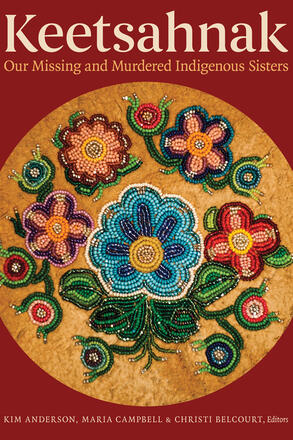
Keetsahnak / Our Missing and Murdered Indigenous Sisters
A powerful collection of voices that speak to antiviolence work from a cross-generational Indigenous perspective.
La description
In Keetsahnak, the tension between personal, political, and public action is clear as the contributors look at the roots of violence and how it diminishes life for all. They create a model for anti-violence work from an Indigenous perspective. They acknowledge the destruction wrought by colonial violence, and also look at controversial topics such as lateral violence, challenges in working with “tradition,” and problematic notions involved in “helping. ” Through stories of resilience, resistance, and activism, the editors give voice to personal testimony and allow for the creation of knowledge.
Récompenses
- Short-listed, Scholarly and Academic Book Award | Alberta Book Publishing Awards, Book Publishers Association of Alberta 2019
Reviews
"Keetsahnak defies categorisation. The book is fundamentally a collective project that seeks to understand and raise awareness of the issue of MMIWG2S, examining the roots of the violence and registering the resilience of Indigenous peoples. Through chapters that are at once political and personal, intimate and analytical, the volume brings together over 35 contributors to honour Indigenous lives. Yet, the volume emphasises the need for action as well as remembrance... [The] lessons borne out of Keetsahnak’s wide-ranging dialogue are invaluable for Indigenous and allied scholars, policy makers, and activists working to bring an end to this crisis." Rebecca Macklin, British Journal of Canadian Studies, Autumn 2021
“Keetsahnak / Our Missing and Murdered Indigenous Sisters will be welcomed by members of Indigenous communities, scholars and students, and all those who are open to the overarching story of resiliency and resistance being shared.” Robina Thomas, University of Victoria
"Keetsahnak will be a staple resource in future research on violence against Indigenous women and girls....future historians and critics studying Indigenous resistance, both at the barricades and through artistic production, will want this book on their shelves." Margery Fee, Canadian Literature, 2019
"The stories in this book are presented with power, truth, humility, and beauty. They reveal complexities of women's lives that cannot be adequately reflected in statistics on Missing and Murdered Indigenous Women." Hilary N. Weaver, The Canadian Journal of Native Studies, 2018
"The essays in Keetsahnak outline historical, legal, cultural, philosophical, and psychological perspectives on the topic of missing and murdered women in Canada. Their power is in detailing the affective consequences of living in pain, grief, rage; simultaneously they offer strategic examples of resilience, legal challenges, and paradigm shifts. There is an immediate and personal tone to each essay that provides a transparency to the process and a depth to the volume, reminding us that we have all been affected by the horrors of this reality. This is a serious and important read… [A]n excellent resource for university students taking courses in the fields of sociology, Indigenous Studies, Women Studies, or Social Work.” Michelle LaFlamme, The Pacific Rim Review of Books, Vol. 14, No. 1 (Winter/Spring 2020)
"Indigenous women, these keepers, continue to go missing and be murdered in staggering numbers in Canada. This new collection of essays, most of which were written by Indigenous women scholars and activists, was edited by Campbell, Kim Anderson, and Christie Belcourt. The essays look at the violence against, the challenges facing, and the action taken by their sisters in this country." Laura Kupcis, Prairie Books Now, June 2018
"If one wishes to examine this international issue of concern on a personal level, wherein the subject is deeply internalized by many Indigenous women and then shared thoughtfully with the reader, this is a good book with which to do so." Wendelin Hume, Great Plains Quarterly, February 2021
"Contributors to the anthology include family members of MMIWG2S, survivors of violence, activists, artists, counsellors, lawyers, and academics who provide insights from unique vantage points. Their incisive analyses offer us compelling testimonies, models of accountability and care, and proposals for action. Rooted in deeply personal stories, these pieces remind us that antiviolence organizing and theory must emerge out of everyday lived experiences.... Keetsahnak is imbued with an urgent call to rethink, complicate, and deepen our understandings of violence against Indigenous women, girls, and two-spirit people." Caroline Fidan Tyler Doenmez, Native and Indigenous Studies, Spring 2021
"Many chapters in Keetsahnak will appeal to academic and non-academic thinkers and teachers alike - allowing readers to think holistically about community remembrance, mourning, celebration and healing." Tracey Lindberg, Alberta Views, July 2019